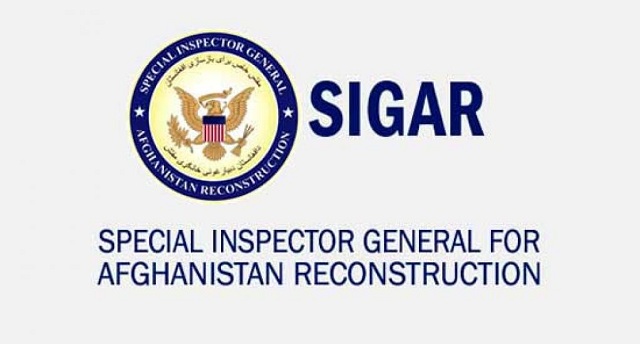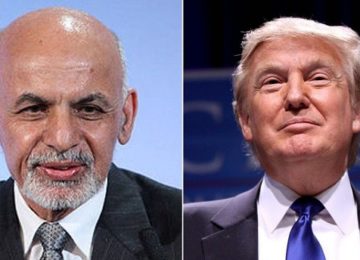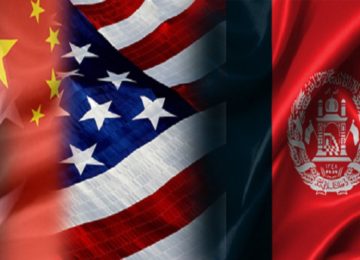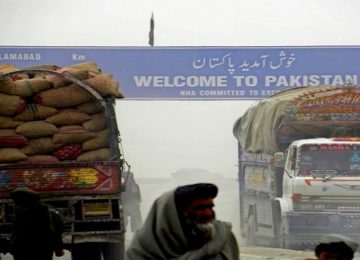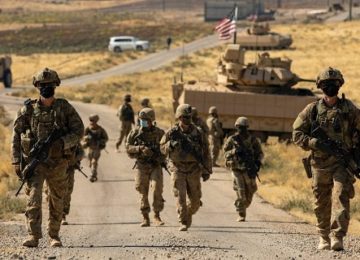The Special Inspector General for Afghanistan Reconstruction (SIGAR), John F. Sopko, while speaking at an event, claimed that Afghanistan was still facing severe deficiencies in rule of law and accountability. Sopko was speaking at the 23rd Annual Herbert Rubin and Justice Rose Luttan Rubin International Law Symposium, presented by the NYU Journal of International Law and Politics, in New York on October 17, 2017. He further argued that the US government had spent too much money, too fast, in a small economy, thus failing to achieve desired outcomes.
Sopko’s speech in Full:
Prepared Remarks of John F. Sopko Special Inspector General for Afghanistan Reconstruction
23rd Annual Herbert Rubin and Justice Rose Luttan Rubin International Law Symposium
Presented by the NYU Journal of International Law and Politics
New York, NY October 17, 2017.
“Thank you and I’m honoured to have been invited today.
As I was preparing for this discussion, I thought back to some of my past experiences fighting corruption. As some of you may know, I’m a former federal prosecutor who targeted the mob in Cleveland in the 1970s. Feeling that job was too safe, I moved to Washington and ran congressional investigations for nearly 30 years, and eventually became a partner at Akin Gump in Washington where I co-led our Congressional Investigations practice.
Then, the White House called and handed me responsibility for ferreting out waste, fraud, and abuse in what is now a $120 billion reconstruction effort in Afghanistan, over 60 percent of which has been spent by the Department of Defense on the security sector. To be frank, I thought I knew everything there was to know about corruption – until my first trip to Kabul.
As an Inspector General, I don’t do policy – so my remarks will focus on what my agency has learned from investigating waste, fraud, and abuse in the midst of an active military and reconstruction mission in one of the world’s most corrupt countries.
My agency, SIGAR, has the largest U.S. law enforcement and auditing presence in Afghanistan, with more agents and auditors on the ground than all other U.S. law enforcement and auditing agencies combined. Since our inception in 2008, SIGAR has arrested 118 individuals and secured 114 convictions for defrauding the American taxpayer. Our auditing team has saved nearly $1 billion for the taxpayer and we are the only U.S. agency still conducting inspections of the billions of dollars of construction and infrastructure built for the Afghans.
Bribery, money laundering, contract fraud – you name it, we’ve seen it in Afghanistan. Since I became the SIGAR in 2012, our investigations directorate alone has recovered another $1.1 billion in criminal fines, restitutions, forfeitures, civil settlements, and U.S. government cost savings and recoveries.
The loss to the U.S. taxpayer from these crimes is odious enough. But the threat from corruption is ultimately far more insidious. When the U.S. goes into a developing country, and the local population witnesses American government employees, military personnel, contractors, Afghan officials that we support, acting illegally and unethically right in front of them – it’s hard for us to make the moral argument that their own government should clean up its act.
Corruption in a conflict zone can also weaken our chances for military success. Last year, we issued a lessons learned report that looked at the entire U.S. effort to combat corruption in Afghanistan since 2001. We found that many of the activities our government undertook actually increased corruption by pouring too much money, too fast, into too small an economy.
The former U.S. commander in Afghanistan, General John Allen, testified to Congress that corruption – not the Taliban – was the existential threat to Afghanistan. Despite that, most of the time our government has been engaged in Afghanistan, counter-terrorism efforts have routinely trumped counter-corruption efforts, i.e. CT trumps CC.
So what can we do?
First, it is critical to create an independent entity like SIGAR that is not beholden to any single agency and can look at trends across agencies.
Secondly, the U.S. and the coalition need to take corruption seriously and have a strategy to address it. The lack of an interagency anti-corruption strategy between DOD, State, and USAID was one of the key findings of the lessons learned report I just mentioned.
Third, writing reports or making policy pronouncements is not sufficient. There is simply no substitute for being in country, conducting investigations, performing audits, inspecting facilities, and meeting with our military, diplomats, and foreign counterparts to pick up tips and follow-up on leads. It’s not an easy environment for our staff to live in, but unlike the annual rotations suffered by State and DOD, we have the ability to keep our people in Kabul for multiple years, allowing them to build the relationships necessary to effectively build criminal cases and conduct effective audits.
Fourth, when you operate in a combat zone with multiple hostile forces and an unreliable civil justice system you need to be flexible, nimble, and willing to take risks. Since the U.S. lacks an extradition treaty with Afghanistan, we have to be creative. Because most illicit proceeds from Afghanistan flow through banking systems in places like Dubai, we strengthened our anti-money laundering capability and hired a former Assistant United States Attorney who is a seasoned expert on money laundering to assist our investigations.
Fifth, you need a willing partner. If you read about the Karzai era, you’ll see example after example of U.S. anti-corruption investigations stymied when President Karzai picked up the phone and instructed Afghan officials to stop prosecutions. But you cannot give up.
Fortunately, the current government has generally been a more willing partner. One early test came when SIGAR was tipped off to a bid-rigging scheme on a $1 billion fuel contract for the Afghan security forces that was to be paid for with U.S. funds. We brought our investigative findings to newly-elected President Ghani, who immediately cancelled the contract, fired those involved, and re-bid the contract – and in the process, the U.S. taxpayer saved about $200 million. President Ghani subsequently established the National Procurement Commission where he personally reviews every major contract, and whose meetings SIGAR is invited to attend as the only U.S. civilian observer.
I’m not Pollyanna. There are still severe rule of law deficiencies in Afghanistan, particularly within the police and the courts. But, with international technical and financial support, there have been increased efforts to hold high-level Afghan officials to account. SIGAR has supported many of these efforts, including the creation of a sequestered Anti-Corruption Justice Center which focuses on prosecuting corrupt senior Afghan officials.
The sixth point that I would like to emphasize that I think hasn’t received enough attention, has been the protection of on-budget assistance, which is where the foreign government directly administers U.S. financial assistance. At the height of the surge, as much of 70 percent of U.S. funding for the Afghan national security forces was being provided directly to the Afghan government with little, if any, U.S. oversight over how those funds were spent. Afghan financial records, to the extent they existed, often weren’t examined. With so much money sloshing around and so few controls, it is no wonder much of it was stolen or wasted.
Recognizing this error from the past, General Dunford, the Chairman of the Joint Chiefs of Staff, recently testified that the amount of funding for the Afghanistan security forces provided on-budget has now been reduced to about 25 percent, with more stringent conditions to ensure that remaining on-budget funds can be audited. But to paraphrase President Reagan, SIGAR believes we must verify, then trust, as does Congress, which has required SIGAR to conduct an evaluation of the implementation of Afghanistan’s national anti-corruption strategy.
The implementation of that strategy will be a key indicator of the political will of Afghan government officials to fight corruption. The U.S. and its partners can train Afghan investigators and prosecutors to be world-class, but if there is no political will to support their investigations, it will be of little consequence. Additionally, the U.S. government must have the political will to ensure that oversight of reconstruction funds is mission critical. We must also have the political will to hold the Afghan government responsible for meeting the conditions they’ve agreed to regarding stewardship of U.S. taxpayer dollars – and to penalize them when those commitments aren’t met.
Finally, I want to emphasize the importance of being transparent about our own work. Some other IG offices take a different approach, but SIGAR publishes all of our work, unless a report is classified or poses a security risk. With publication, comes publicity, which doesn’t always please those who don’t want bad decisions exposed, but I believe the publicity surrounding our work serves a constant reminder that there is someone out there going after people wasting or stealing funds in Afghanistan. This not only acts as a deterrent, but has led to a number of U.S. and Afghan government civilians and military personnel reporting malfeasance for us to follow up on.
In conclusion, I just returned from my most recent quarterly trip to Afghanistan and witnessed the positive results of our emphasis on transparency. I can honestly say that SIGAR is better known in Afghanistan than in the United States, and from the Afghan president down to the average Afghan citizen, our reports are read and used to improve Afghanistan’s efforts to fight corruption. That fact, ultimately, may be the best and most lasting legacy of my little agency.
With that, I look forward to your questions.”
Source: Special Inspector General for Afghanistan Reconstruction (SIGAR).
© Center for Research and Security Studies (CRSS) and Afghan Studies Center (ASC), Islamabad.



